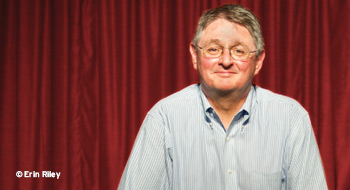
Pond produces a peak performance for the pension industry
At the surface, it appears as though Robin Pond took the well-worn cliché “write what you know” to heart when he scripted The Retirement Plan. The satirical play, which played at the Toronto Fringe Festival this summer, is about a couple who signs up for a unique retirement product offered by Certainty Insurance that guarantees your money will be sufficient for the rest of your life. But although the play is inspired by his workaday world, Pond’s avocation as a playwright has a backstory that long precedes his role as an investment consultant with Buck Consultants.
Pond’s penchant for writing short plays has led to more than 60 productions in community theatres and schools in Canada, the U.S. and the U.K. And his first full-length play, Prevailing Wins, was picked up in New York City and premiered off-Broadway at the 2010 Midtown International Theatre Festival and later published by Eldridge Publishing.
Even though the worlds of pensions and investments and playwriting are very different, Pond says there is overlap from time to time. While working at Towers Perrin (now Towers Watson) back in the 1990s, his practice leader, Wendy Brodkin, wanted to do a client presentation that wouldn’t involve yet another boring PowerPoint deck. “She wanted something that was going to make a bigger splash,” recalls Pond, who dutifully wrote a short play about an investment manager apologizing for a bad performance at a meeting with a client. Needless to say, the play was successful; Pond took the play across the country and played the role of the investment manager.
“I have always felt the investment and pension industry is ripe for parody,” says Pond, who spent four years studying linguistics toward a PhD at Cornell University.
During that time, Pond received his first lesson in economics.
“After nine years of full-time university, I couldn’t get a job with this stuff. Then I started working for an accounting firm, a bank and then an insurance company. And while I was doing that, I did all the practical studies—I did an MBA, I did an accounting designation and then the certified financial analyst, which led me to investments. So that’s how I earn a living.”
In spite of the economics, Pond values his creative writing because he says it provides a sense of accomplishment. “I’d make more money if I had a second job driving a cab, but the advantage is, I’m writing exactly what I want to write. And for that reason, I think it is more about self-actualization.”
The Retirement Plan was borne out of observations that had been “bubbling up in the back of my mind,” and it’s a means to express how the industry tends to overestimate the importance of its discipline, says Pond, who artfully lampoons the retirement dream that’s often seen in commercials—where the grandfather’s off on a yacht or on a fabulous vacation with the grandchildren. “I think there’s a group of people who think their goal in life is to die rich. But there’s a long way between making sure you’re not destitute on the street and living the life of a millionaire once you turn 65 or 70,” says Pond.
The play has gone through a couple of stage readings, including one at the Centre Stage theatre in Greenville, S.C., where Mark Medoff, who wrote Children of a Lesser God, moderated the talkback session after the play was read. The play garnered a few good laughs, says Pond, but when Medoff asked why the play was funny, he got an interesting response: “A small percentage said, ‘That was very disturbing.’ Which is just what you want, I think….I don’t think they liked how it portrayed humanity, if not themselves.”
Rehana Begg is editor of Benefits Canada.
Get a PDF of this article.
